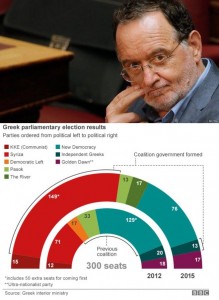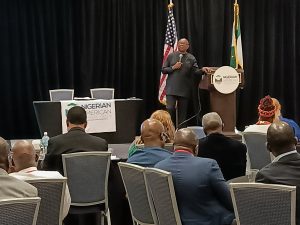Very good case study for APC, Buhari and Tinubu

Greece crisis: Syriza rebels form new party

Rebels from Greece’s governing left-wing Syriza are to break away and form a new party.
Prime Minister and Syriza leader Alexis Tsipras stood down on Thursday, paving the way for new elections.
The move came after he lost the support of many of his own MPs in a vote on the country’s new bailout with European creditors earlier this month.
Greek media reports say 25 rebel Syriza MPs will join the new party, called Laiki Enotita (Popular Unity).
The party will be led by former energy minister Panagiotis Lafazanis, who was strongly opposed to the bailout deal.
At a press conference in Athens, Mr Lafazanis said he was ready to respect the result of a referendum held in July, in which 61% of Greeks said they would not support the terms of the bailout.
“If it is necessary for us to cancel the memorandum, we will follow the course of exiting the euro,” he is quoted by Kathimerini newspaper as saying.
‘Eurozone dictatorship’
Syriza won 149 seats in Greece’s 300-seat parliament in the last election in January.
The conservative New Democracy party came second, with 76 seats.
The new Popular Unity party becomes the third largest in parliament.
In exchange for a new €86bn ($95bn; £61bn) from European partners, Mr Tsipras had to agree to painful state sector cuts, including far-reaching pension reforms – and keep Greece in the eurozone.
Close to a third of Syriza’s MPs abstained or voted against the terms of the new deal last week.
At the time, Mr Lafazanis said he was determined to “smash the eurozone dictatorship”.
Syriza split: Key questions
What is Laiki Enotita (Popular Unity)? The new left-wing party has 25 rebel Syriza MPs, who object to Mr Tsipras’s acceptance of more austerity.
Its leader, Panagiotis Lafazanis, argues that Greece would be better off leaving the euro and going back to the drachma.
What are Mr Tsipras’s chances of re-election? Despite his dramatic policy reversal over austerity – an opinion poll last month gave him a 61% approval rating.
If elections are set for 20 September that deadline gives the new rival left-wing party very little time to organise and rally support to fight Mr Tsipras.
Many observers expect him to be re-elected, with a stronger mandate to push through the reforms demanded by the creditors.
How are people reacting to the latest developments?
Greece’s eurozone lenders are being cautious. The chair of the Eurogroup (the eurozone finance ministers), Jeroen Dijsselbloem, said “it’s crucial that Greece maintain its commitments to the eurozone”.
Voters are also worried. One Athens resident told Reuters: “We will go through a period of insecurity and this is, of course, not the best thing to happen right now.”
What next for Greece?
On Friday morning, the head of conservative New Democracy party, Vangelis Meimarakis, met Greece’s president and he will now have three days to form a government.
Observers say he does not have enough support and elections will be called.
Reports suggest the election – the fifth in six years – will be called for 20 September.
If Mr Meimarakis fails to form a government, the chance will be given to the new party, analysts say, and then the far-right Golden Dawn party.
They, too, are unlikely to be able to gain enough allies to establish a government.
All parties can waive the right to negotiate and allow the president to approve a snap election.
Mr Meimarakis, however, has said he will try and use his mandate to form a government in the next few days.
Dimitris Stratoulis, one of the new members of Popular Unity, told Reuters that his party would also try to use the mandate and put a government together.





